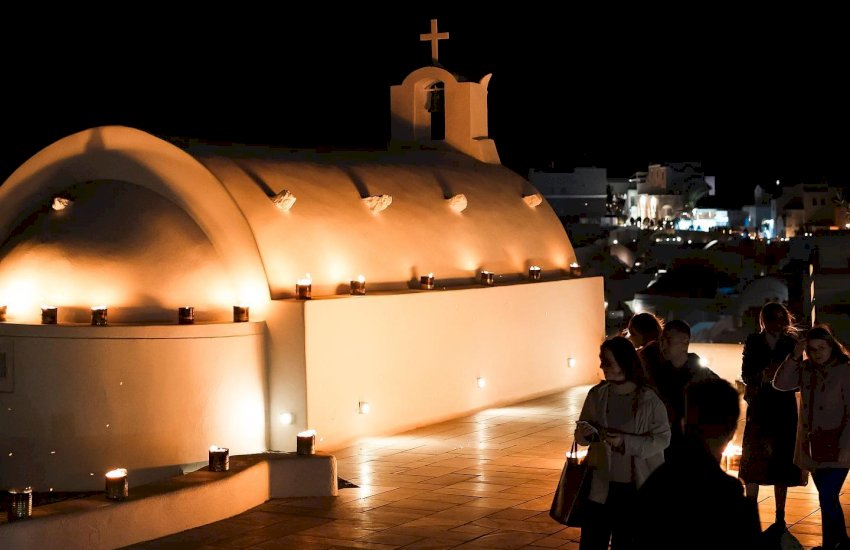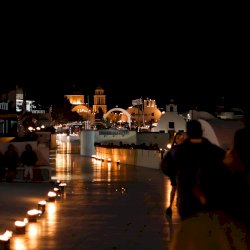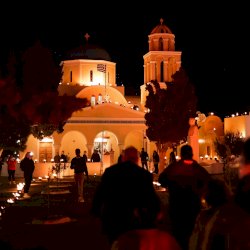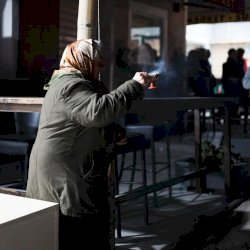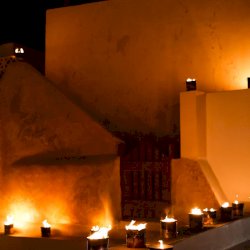Good Friday Greek customs and traditions
Good Friday Greek customs and traditions
It is a mourning day, people visit their lost loved ones' graves to clean them and light the candles.
On Good Friday Greeks cook simple food with no olive oil, seasoned with vinegar reminding us of the soldier who gave Jesus vinegar instead of water.
It is customary to prepare soups symbolizing Virgin Mary’s tears. The most common dish is lentil soup.
Church bells are mourning bells, ringing a single ring at regular intervals throughout the day.
The Epitaph - Epitaphios
The word epitaphios is an adjective meaning “funerary, happening on a grave”; it is the Greek title for Thucydides’ (Greek historian) famous “Pericles’ Funeral Oration”, and the origin of the word epitaph. Within a liturgical context, this is also the name of an icon, made of cloth embroidered with gold and silver thread representing the shroud of Christ, and depicting the body of Christ being laid in the grave. The word Epitaphios denotes the bier and canopy containing the icon, but also the entire procession.
People during the day pay their respects to the beautifully decorated with flowers Epitaph - Epitaphios, (symbolising Christ's tomb) and pay their respects to Christ’s icon which has been taken down from the cross.
Children pass beneath the Epitaph and people pick a small piece of flower to place it among their home icons.
In the evening the service begins; at the end of the service, the epitaph is lifted on the shoulders of priests or churchgoers (usually four to six people) and they go out of the church in the street.
At 9 pm the Epitaph procession starts led by the clergy, the altar boys wearing beautiful liturgical robes and carrying the liturgical fans, church bells ring the funeral toll and people follow holding the yellow (mourning) candles. In cities and villages with more than one parish, all different church processions meet at a single point, stop, and all sing together.
There are many variations in the different regions like in Hydra, Tinos, and other islands, where the men carrying the Epitaphios march right into the sea, remain there for several minutes, saying prayers for the safe return of the seafarers.
During the Epitaph procession everybody chants one of the prettiest hymns called "Oh my sweet springtime" “Ω γλυκύ μου έαρ” (translated below)
All Generations offer a hymn to your burial my Christ.
The Arimathean took you down from the cross and buried you in a tomb.
Women came with spices to give thee perfume and prepare your burial.
Hither creation was made, let us sing hymns to praise our Creator.
Nourished from above with manna, lifted heels of contempt against their benefactor.
Joesph is buried by Nikodemos, body of the Creator.
Oh my sweet spring, my sweetest child, where does your beauty fade?
Son of God, Almighty, my God and Creator, How can I receive your passion?
Women with spices, came very early in the morning to sprinkle the grave with perfume.
O my Holy Trinity, Father, Son and Spirit, have mercy on the world.
Allow us to serve you Virgin, to see your Son's resurrection
Photos & Video Zorbabook at Oia, Santorini

